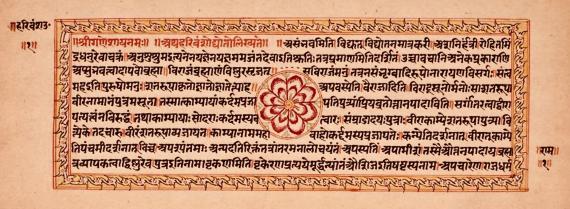The Sanskrit language is the key to a storehouse of information about the world and the human experience recorded over more than 3,000 years in South Asia. It is the language in which the Vedas were composed in the second millennium B.C.E., and is still used today as a language of religion and scholarship. It is also the parent of the modern Indo-Aryan languages of north and central India, including Hindi, Bengali, Marathi, and many others.
Sanskrit has been taught at UW for over 100 years, and the Department of Asian Languages and Literature has long been a world-renowned center for Sanskrit studies. However, in the wake of several retirements and a lack of sufficient dedicated funding to support the program, we can no longer provide a full course of instruction in Sanskrit with state funding.
In response to this urgent need, Friends of Sanskrit at UW was formed in 2018 to ensure continued instruction in Sanskrit at UW and to help connect the local community with UW’s Sanskrit programming. The Friends of Sanskrit at UW fund has supported the hiring of a Sanskrit lecturer, enabling the Department to continue to offer all levels of the language as well as courses on various aspects of Sanskritic culture and literature. We welcome your support: Become a Friend of Sanskrit by donating here.
We invite you to learn more about the Sanskrit language and upcoming course offerings at UW. You can also follow Friends of Sanskrit on Twitter to stay up to date on events and announcements.
In October 2023, our friend and supporter Lin Tian wrote this piece for his company newsletter on why he supports the Sanskrit program at UW. With his permission, we have reproduced it here:
October, sweet October—it's not just a month for giving, but also a season for sugar and candies, our bulwark against the "trick or treat" threats.
Sugar, recognized as "zucker" in German, "sucre" in French, "zucchero" in Italian, or "azúcar" in Spanish, and candy, similarly known across these languages, point us to a common thread: their nomenclature and concept originate from a foreign language. In this case, that language is Sanskrit, with 'sugar' stemming from "śarkarā" and 'candy' from "khaṇḍaka."
Interestingly, India has been a sugar production hub since ancient times, disseminating not just sugar but also the technology to manufacture it worldwide. The terms 'sugar' and 'candy' are etymological evidence, borrowing from the ancient and venerable language of Sanskrit. More fascinating is that within India, a type of soft sugar is named "cīnī," literally meaning "from China." This etymological twist was unraveled by Chinese scholar Xianlin Ji in his "A History of Sugar." The term signifies how sugar-making techniques traveled from the Indian subcontinent to China around the 6th century, and were then reintroduced to India via Bangladesh in the 13th century, giving birth to the name "cīnī."
Sanskrit, a language rich in religious, historical, and scientific contexts, has been crucial for modern linguistics, enabling the reconstruction of proto-languages and enlightening our understanding of languages and history. The tale of "cīnī," channeled through Bangladesh, attests to Sanskrit's role as a witness to global cultural exchanges.
Sanskrit demands intense study and dedication. To understand its scripts and the religious, historical, and philosophical meanings they convey requires years of specialized training.
The Department of Asian Languages and Literature at the University of Washington, a leader in Sanskrit education for over 100 years, is facing a challenge. Budget constraints threaten to disrupt this long-standing tradition. Once interrupted, regaining the current level of expertise becomes almost impossible.
For me, supporting "Friends of Sanskrit" is deeply motivated by the respect I have for the local, diverse community and the University's role in nurturing this invaluable tradition.
If you share my passion for supporting a local institution with such a rich history, I urge you to donate to the "Friends of Sanskrit" fund. Thank you, and may your October be as sweet as the story of cīnī!
